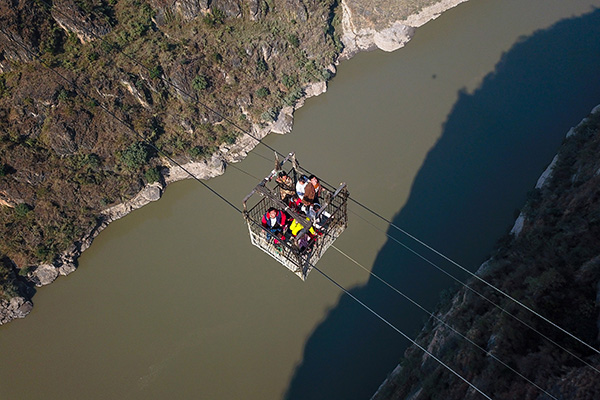
Residents use an aerial cable bridge to cross the Jinsha River, a major tributary of the Yangtze River, in Butuo county, Sichuan province, on Dec 22. This is the last cable bridge in use across the river. A new bridge is expected to be put into use early next year. [Photo/China Daily]
China has set a goal to renovate 180,000 kilometers of rural road and 2,500 dilapidated bridges next year, to help lift people out of poverty and ensure better living standards, the Ministry of Transport said on Dec 26.
“It is one of 12 missions to fulfill the people’s needs in 2018,” Wu Chungeng, a ministry spokesman, said at a news conference in Beijing.
Next year, 200,000 km of new rural road will be built, 5,000 more villages will have access to asphalt roads, and buses will operate in 5,000 more villages, he said, adding: “These link to people’s most direct and pragmatic interests.”
The mission is a continuation of work carried out this year, when the central government set a goal to renovate 80,000 km of rural road and 1,800 unsafe bridges.
With the new year approaching, Wu said the ministry has surpassed that target by upgrading 130,000 km of road and 3,300 unsafe bridges.
In poverty-stricken areas, people use aerial cables to cross rivers and chasms. In the southwestern province of Sichuan, a survey was conducted in 2013 to plan the renovation of 77 aerial pulley bridges, or replace them with real bridges, linking 459 km of country roads, said Zhang Qi, deputy director of the Sichuan Transportation Bureau.
The work is expected to be completed in 2018, he said, adding that his authority will bring “an end to the era of cable bridges”.
So far, 74 bridges have been renovated, leaving three still under construction. Two of them cross the Jinsha River, a major tributary of the Yangtze River. The other crosses Tangjiashan Lake.
The bridges are all in areas with complicated geological conditions, Zhang said. “The project will mean thousands of people in 499 villages no longer need to use cables to cross rivers, and it will greatly improve quality of life and boost the local agricultural economy and tourism.”
President Xi Jinping has stressed the significance of construction, maintenance and operation of rural roads in the battle against poverty.
Efforts should be made to build good roads in rural areas and maintain them to ensure a better quality of life for farmers and accelerate agricultural modernization, Xi said ahead of a national transport conference on Dec 25.
The move to improve rural roads has produced tangible benefits, bringing more people and wealth to poor regions and rallying community support for the Communist Party of China, said Xi, who is also general secretary of the CPC Central Committee.
At the conference on Dec 25, transport authorities agreed to focus on prominent problems, and improve policies and mechanisms to advance high-quality development of rural roads.
In the past five years, China has built or renovated 1.28 million km of rural roads, with 99.24 percent of townships and 98.34 percent of villages connected by asphalt or cement roads.
